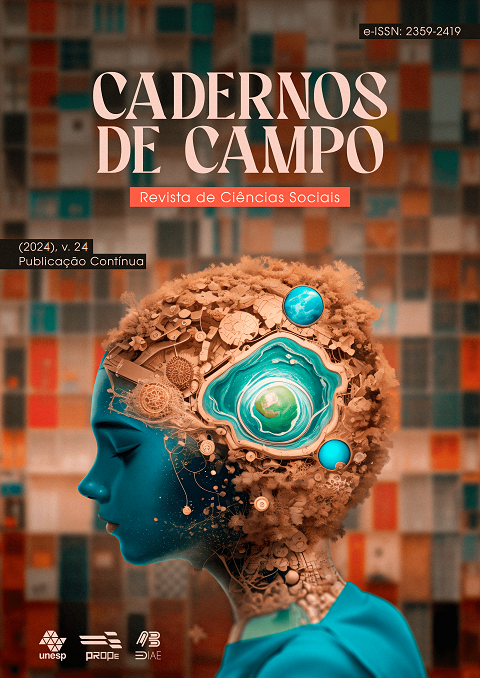Corpo, fitness e publicidade
Uma análise sociológica sobre a atuação de influenciadora nas plataformas digitais
DOI:
https://doi.org/10.47284/cdc.v24i00.16800Palavras-chave:
Fitness, Disciplinamento Corporal, Gênero, Publicidade, Mídias DigitaisResumo
Neste artigo, são discutidos os discursos fitness gerados na era digital, com foco na análise dos conteúdos produzidos pela influenciadora e “musa fitness” Gabriela Pugliesi por meio das plataformas digitais. Utilizando uma abordagem semiológica, foram analisadas postagens feitas por ela no Instagram ao longo de 2020, destacando como seus conteúdos contribuem para os discursos fitness e se conectam com estratégias publicitárias conforme as demandas do ambiente digital. O argumento central é que a influenciadora associa os produtos que promove à sua própria imagem corporal, utilizando sua vida pessoal e cotidiana para promover e vender um estilo de vida saudável e feliz. Nesse contexto, os discursos em torno de sua corporalidade, vista como desejável e aspiracional, acabam por marginalizar os corpos que não se enquadram nos padrões fitness, os quais são submetidos a processos de normalização.
Downloads
Referências
ADELMAN, Miriam; RUGGI, Lennita. Corpo, identidade e a política da beleza, algumas reflexões teóricas. Novos Olhares, Muitos Lugares. Florianópolis: Editora Mulheres, 2007.
BAYM, Nancy. Playing to the crowd: Musicians, audiences, and the intimate work of connection. NYU Press, 2018.
BELELI, Iara. Corpo e identidade na propaganda. Revista Estudos Feministas, v. 15, n. 1, p. 193-215, 2007. DOI: 10.1590/S0104-026X2007000100012. Disponível em: https://www.scielo.br/j/ref/a/nPT6zypmvrXB44bSR5ydC5v/abstract/?lang=pt. Acesso em: 15 jul. 2023.
BELELI, Iara. Marcas da diferença na propaganda brasileira. 2005. Tese (Doutorado em Ciências Sociais) – IFCH, Unicamp, Campinas, São Paulo, 2005.
BUTLER, Judith. Regulações de gênero. Cadernos Pagu, Campinas, São Paulo, n. 42, p. 249-274, 2014. Disponível em: https://periodicos.sbu.unicamp.br/ojs/index.php/cadpagu/article/view/8645122. Acesso em: 15 jul. 2023.
CASSINO, João F. Modulação deleuziana, modulação algorítmica e manipulação midiática. In: AVELINO, Rodolfo; SILVEIRA, Sérgio; SOUZA, Joyce (org.). A Sociedade de Controle. 1. Ed. São Paulo: Hedra, 2018. p. 13- 30.
CSORDAS, Thomas. A corporeidade como um paradigma para a antropologia. Corpo/significado/cura. Porto Alegre: Editora da UFRGS, p. 101-46, 2008.
CASTELLS, Manuel. A comunicação na era digital. O poder da comunicação. São Paulo/Rio de Janeiro: Paz e Terra, 2015.
DE LAURETIS, Teresa. Technologies of gender: Essays on theory, film, and fiction. Indiana University Press, 1987.
DELEUZE, Gilles. Post-Scriptum Sobre as Sociedades de controle. In: DELEUZE, Gilles. Conversações. Trad. Peter Pál Pelbart. São Paulo: Editora 34, p.219-226, 1992.
ECO, Umberto. Para uma investigação semiológica sobre a mensagem televisional. In: ECO, Umberto. Apocalípticos e integrados. São Paulo: Perspectiva, p. 365-386, 1976.
FOUCAULT, Michel. Poder-corpo. In: FOUCAULT, Michel. Microfísica do poder, 9. Ed. Rio de Janeiro/São Paulo: Paz &Terra, 2019.
JAGGAR, Alison M.; BORDO, Susan R.; DE FREITAS, Britta Lemos. Gênero, corpo, conhecimento. Rio de Janeiro: Rosa dos Tempos, 1997.
KARHAWI, Issaaf. Influenciadores digitais: o Eu como mercadoria. Tendências em comunicação digital. São Paulo: ECA/USP, 2016.
KARHAWI, Issaaf. Influenciadores digitais: conceitos e práticas em discussão. Communicare, v. 17, p. 46-61, 2017. Disponível em: https://edisciplinas.usp.br/pluginfile.php/4979443/mod_resource/content/1/Artigo-1-Communicare-17-Edic%CC%A7a%CC%83o-Especial%20%282%29.pdf. Acesso em: 15 jul.2023.
LAZZARATO, Maurizio. As revoluções do capitalismo. Civilização Brasileira, 2006.
LANDA, María Inés. Subjetividades y consumos corporales: un análisis de las prácticas del fitness en España y Argentina. Razón y Palabra, v. 14, n. 69, 2009. Disponível em: https://www.researchgate.net/publication/40902005_Subjetividades_y_consumos_corporales_Un_analisis_de_las_practicas_del_fitness_en_Espana_y_Argentina. Acesso em: 15 jul. 2023.
LUPTON, Deborah. Digital sociology. Routledge,2014.
MALUF, Sônia Weidner. Corpo e corporalidade nas culturas contemporâneas: abordagens antropológicas. Esboços: histórias em contextos globais, [S.I], v. 9, n. 9, p. 87-101, 2001. Disponível em: https://periodicos.ufsc.br/index.php/esbocos/article/view/563. Acesso em: 15 jul. 2023.
PRECIADO, Paul B. Testo Junkie: sexo, drogas e biopolítica na era farmacopornográfica. São Paulo: n-1 edições, 2018.
POELL, Thomas; NIEBORG, David; VAN DIJCK, José. Plataformização. Fronteiras- estudos midiáticos, [S.I], v. 22, n. 1, p. 2-10, 2020. DOI: 10.4013/fem.2020.221.01. Disponível em: https://revistas.unisinos.br/index.php/fronteiras/article/view/fem.2020.221.01. Acesso em: 15 jul. 2023.
VAN DIJCK, J. La cultura de la conectividad: Una historia crítica de las redes sociales. Buenos Aires: Siglo Veintiuno Editores, 2016.
Downloads
Publicado
Edição
Seção
Licença
Copyright (c) 2024 Cadernos de Campo: Revista de Ciências Sociais

Este trabalho está licenciado sob uma licença Creative Commons Attribution 4.0 International License.









